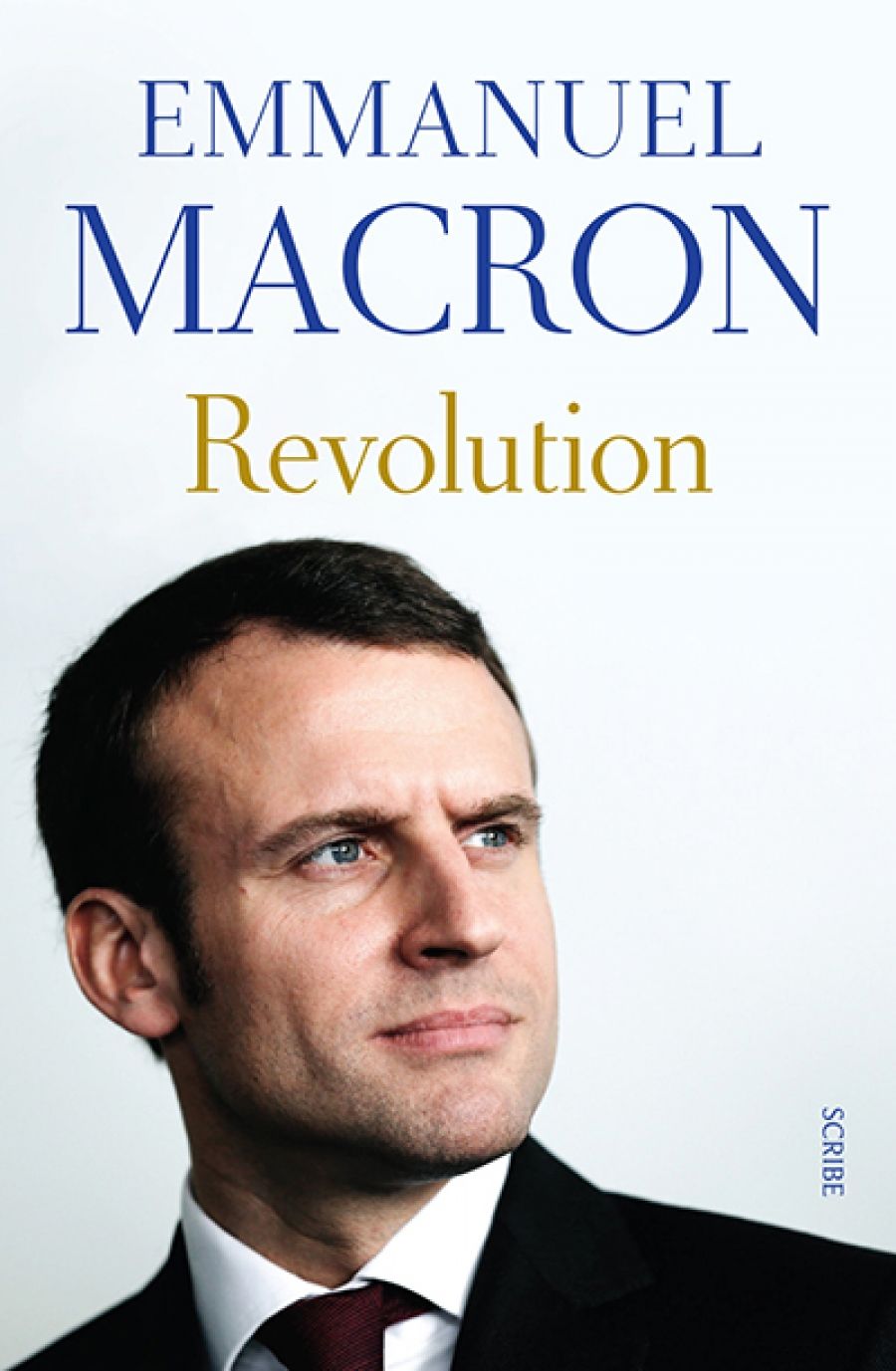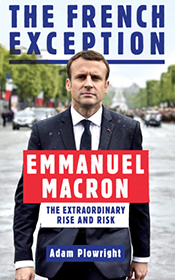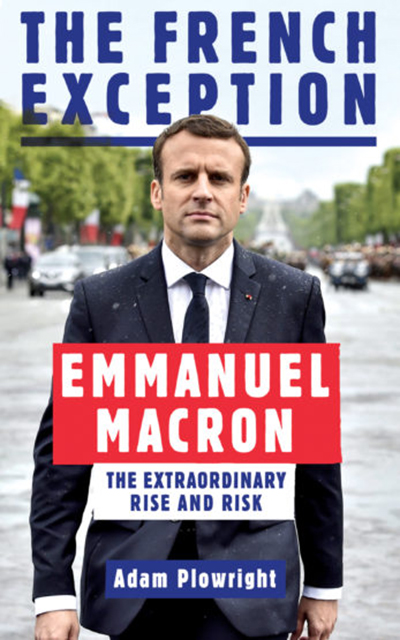
- Free Article: No
- Contents Category: Politics
- Custom Article Title: Natalie J. Doyle reviews 'Revolution' by Emmanuel Macron, translated by Jonathan Goldberg and Juliette Scott and 'The French Exception: Emmanuel Macron: The extraordinary rise and risk' by Adam Plowright
- Review Article: Yes
- Online Only: No
- Custom Highlight Text:
After a succession of dramatic political events across the Western world in 2016, all eyes were on the French presidential election when it took place in the first half of 2017. Would the French resist the sirens of populism? Would the surprise campaign of the youngest candidate ever, Emmanuel Macron, offer a ...
- Book 1 Title: Revolution
- Book 1 Biblio: Scribe, $32.99 pb, 264 pp, 9781925322712
- Book 2 Title: The French Exception
- Book 2 Subtitle: Emmanuel Macron: The extraordinary rise and risk
- Book 2 Biblio: Icon Books, $29.99 pb, 373 pp, 9781785783111
- Book 2 Cover Small (400 x 600):

- Book 2 Cover (800 x 1200):

- Book 2 Cover Path (no longer required): images/ABR_Online_2018/March_2018/The%20french%20exception.jpg
These circumstances allowed Macron to position himself as the last line of defence against Marine Le Pen, the candidate from the xenophobic, neo-nationalist National Front, whose historical connections to extreme right-wing anti-Semitic views have not been forgotten, despite Marine Le Pen’s attempts to ‘normalise’ the party. All the hype surrounding this probably overstated threat hid from view the fact that Macron’s candidature only appealed strongly to a quarter of the French electorate, as indicated by his result in the first round (24.01% of those who attended a polling booth) and the record low level of electoral participation in the second one (74.56%).
Nevertheless, Macron did create in a very short period of time a new movement, En Marche, which, following his election, became a party that secured a profound renewal of the French National Assembly. This in itself warrants attention. La République en Marche (REM) obtained an absolute majority in the legislative election, sweeping away many long-standing members of the two main parties (especially the Socialist party) and bringing in a whole new generation of politicians, for the first time much more representative of the ethnic diversity of contemporary French society and much more gender balanced. How did Macron succeed in inspiring sections of a largely depoliticised French electorate to go out and campaign? Was it personal charisma, an original vision, or both? The publication of The French Exception, Adam Plowright’s analysis of Macron’s victory which provides a wealth of information not only on Macron’s biography but also very appropriately on the social, economic, and political context of the 2017 elections, encourages us to formulate our own responses by providing valuable information from a great variety of sources, including interviews with representative French voters and politicians, even anonymous leading figures of the Macron campaign.
Much can be gleaned also from reading Macron’s own electoral manifesto, now available in English (although one must note that the translation has a number of flaws that create confusion and in one case betray the original text). Reading Revolution (first published in November 2016, and since translated by Jonathan Goldberg and Juliette Scott) is instructive not so much for the vision it outlines but for what it reveals about the limitations of Macron’s understanding of the problems besetting France, despite a laudable attempt to account for the new social divisions caused by globalisation. The book opens with Macron’s own account of the genesis of his political ambition. It then outlines his interpretation of the reasons why the French have become champions of pessimism and why they have lost faith in their political system. Globalisation is challenging the understanding French people have of their cultural identity though its ‘provincialisation’ of Europe, but also through its deregulating force, their attachment to a social model strongly committed to an understanding of the role of the state in promoting economic equality. Macron goes on to propose solutions which culminate in a bold new vision for political sovereignty at the European level and advocacy for greater regulation globally.
 Emmanuel Macron (Presidencia de la República Mexicana, Wikimedia Commons)The first introspective part clearly demonstrates Macron’s belief in his historical mission to restore both French geopolitical influence and France’s economic standing after years of low economic growth and high unemployment, especially among young people. Throughout the book, this mission is presented with references to Charles de Gaulle’s historical leadership. These references are very selective in so far as Macron’s belief in the need for a quasi-federal European Union clearly sits very oddly with de Gaulle’s own deep suspicion of European technocracy and attachment to an international order based on the nation-state. The significance of Macron’s partially Gaullist tone is judiciously highlighted by Plowright, whose first chapter starts by reviewing the significance of de Gaulle’s legacy. Plowright, however, does not delve into a phenomenon which has contributed much to growing French pessimism in the last ten years and the loss of faith in the political establishment: the fact that France’s leadership of Europe pursued by de Gaulle through the creation of a Franco-German axis and deepened by President François Mitterrand through the creation of the European Union (and of the euro) has been fundamentally shaken. The success of the German economy predicated on a beggar-thy-neighbour neo-mercantilism translated into a management of the financial crisis largely dictated by the values and needs of Germany. This is central to the turmoil of the French party system on which Macron capitalised.
Emmanuel Macron (Presidencia de la República Mexicana, Wikimedia Commons)The first introspective part clearly demonstrates Macron’s belief in his historical mission to restore both French geopolitical influence and France’s economic standing after years of low economic growth and high unemployment, especially among young people. Throughout the book, this mission is presented with references to Charles de Gaulle’s historical leadership. These references are very selective in so far as Macron’s belief in the need for a quasi-federal European Union clearly sits very oddly with de Gaulle’s own deep suspicion of European technocracy and attachment to an international order based on the nation-state. The significance of Macron’s partially Gaullist tone is judiciously highlighted by Plowright, whose first chapter starts by reviewing the significance of de Gaulle’s legacy. Plowright, however, does not delve into a phenomenon which has contributed much to growing French pessimism in the last ten years and the loss of faith in the political establishment: the fact that France’s leadership of Europe pursued by de Gaulle through the creation of a Franco-German axis and deepened by President François Mitterrand through the creation of the European Union (and of the euro) has been fundamentally shaken. The success of the German economy predicated on a beggar-thy-neighbour neo-mercantilism translated into a management of the financial crisis largely dictated by the values and needs of Germany. This is central to the turmoil of the French party system on which Macron capitalised.
Reading Revolution, one cannot help but be struck by Macron’s quasi-narcissistic tone, his belief in his destiny, belief conveyed in part through the literary style used in the first autobiographical part, which echoes de Gaulle’s memoirs, whilst not quite matching their solemn tone. As Plowright points out, Macron was trying to fit into the historical mould of France’s great providential men. It is hard, however, to judge the extent to which he really believes in his own historical mission. Plowright explores thoroughly this personal dimension of the Macron enigma, with sometimes rather damning statements about Macron’s ruthless ambition, his power of seduction, his ‘faux-naivety’, his highly effective image management strategy. At the same time, he is refreshingly measured when it comes to discussing Macron’s marriage, pointing to the risk of double standards when it come to age-gap relationships between men and women. Going against all the rumours, Plowright stresses the genuine nature of the relationship. He does not, however, discuss how Macron’s marriage fits into his entire political persona, his appeal to a generation focused on the deconstruction of conservative social norms in the personal sphere, committed to micro-politics but reluctant to contemplate problems relevant to the majority. This is important because of the confusion surrounding the definition of left-wing views now reduced to identity politics, confusion which permeates Macron’s own political image.
Plowright’s analysis of Macron’s political itinerary is quite exhaustive and perceptive. It highlights the specificity of the French technocratic state, its revolving door recirculating élites between the private and public spheres and powered by the élitist education system under the cover of meritocracy. It allowed Macron to rise to the highest position despite never having held a democratically elected position. Plowright, however, does not really account for the central paradox of Macron’s success based on a discourse purporting to be rejecting the domination of the French political establishment, yet ultimately remaining faithful to the dominant narrative of French élites: the root cause of their failure to address the economic problems afflicting the nation is not their incompetence or even corruption but the failure of French society to ‘modernise’, to align with Anglo-American economic liberalism and deregulate its labour market as did Germany at the beginning of the twenty-first century. Meanwhile, the problems caused by the euro, untouchable because it is a symbol of French political influence, have been swept under the carpet.
 French President Emmanuel Macron and First Lady Brigitte Macron at the Bastille Day military parade in Paris, July 14, 2017 (Wikimedia Commons)
French President Emmanuel Macron and First Lady Brigitte Macron at the Bastille Day military parade in Paris, July 14, 2017 (Wikimedia Commons)
Perhaps not surprisingly seeing that he is a British journalist and the British public has never been interested in the complexities of the European Union’s workings, Plowman also does not address the elephant in the room: the fact that Macron’s promise to make France great again by making Europe great again is likely to come against the same problem as that encountered by his predecessor, François Hollande, the unwillingness of the German political establishment to reconsider its monetarist philosophy and commitment to public austerity and to engage in complex renegotiations of the terms of monetary union. The desire of an ageing German society for financial stability and the vested interests of business are likely to put a break on any reforms that would fundamentally transform the European Union, give it a fiscal capacity and allow it to invest as Macron advocates with the support of many leading economists, such as the American Joseph Stiglitz or the former Greek Finance Minister Yanis Varoufakis.
So, what should be retained from Macron’s manifesto? His social liberalism which remains quite French in its emphasis on the role of the state, in his commitment to public education, to industrial policy, environmental sustainability, and social inclusion is undeniably inspiring. One will, however, not find in his manifesto the kind of soul-searching now needed in France, with respect to its élites’ fetishistic attachment to the euro as a symbol of French political influence, to a supposedly superior German economic model now in fact running out of steam, and, beyond it, to old economic theories invalidated by the persistent economic crisis. Yet Europe is crying out for new French leadership and the Western world for a new vision.


Comments powered by CComment